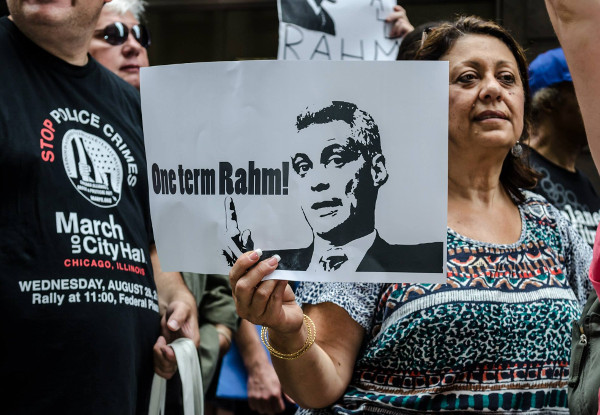
PHOTO/SARAH JANE RHEE
CHICAGO, IL — Chicagoans will have an opportunity to vote for aldermen and mayor in a hotly contested political season, with national significance. The context of this election year is an economic depression that will not go away, and a city administration which attacked worker pensions, closed mental health clinics and schools, and privatized everything in sight. After active teachers and parents were unable to defend their right to education by appealing to their government, they resorted to running for office. Each and every alderman and all city offices are in the grip of the Democratic Party. The main question in these elections is, are fissures emerging in the Democratic Party stranglehold?
We have reported on some independent candidacies in previous issues of the People’s Tribune. In the 25th Ward, three of six challengers identify themselves as “socialist.” Alberto Bocanegra (15th Ward) is running for alderman as a Green Party member. The Green Party has endorsed several other candidates as well. One of the common planks is the opposition to corporate, “downtown” control, and a key slogan of mayoral candidate Jesus “Chuy” Garcia is to put the neighborhoods first, a lesson he says he learned from his experience with Mayor Harold Washington.
Mayor Rahm Emanuel began this campaign with approval ratings dipping into the 30% range. All of the challengers, mayoral and aldermanic, expect to capitalize on hatred of the mayor. But will voters find something they want to cast a ballot for?
All challengers are trying to force a runoff, when an outright victory may not be possible. Mayor Emanuel has a ten million dollar war chest. Alderman Bob Fioretti, a long-time antagonist of the mayor, has been courting the teachers’ union and parent activists for years and on that base is running for mayor. Garcia, with many years in progressive politics, says he now has $1 million in the bank. That challenge to the mayor is forcing Emanuel to spend his money flooding the TV with ads lying about his own record, rather than funneling money to crush challengers to his alderman incumbent buddies.
To what extent are these challenges another face of the Democratic Party seeking to corral in the voters with promises that will necessarily be unfulfilled? For example, Mayor Emanuel swept into office with promises about rebuilding the neighborhoods.
Campaigns that tap into the discontent of the grass-roots struggles for food, clothing, shelter, education—the right to survive—are direct challenges to a system that cannot answer the demands made upon it, except by increased repression. In the midst of such struggles, when traditional forms of party organization cannot hold, opportunities arise to fight for a cooperative society that can guarantee our needs. Electing independent candidates furthers those opportunities. The teachers’ union has been in the forefront of developing an independent political organization. Some such political expression of the workers is the next step in challenging the machinery of the Democrats, a necessary step in developing a force that represents the dispossessed of our city.
